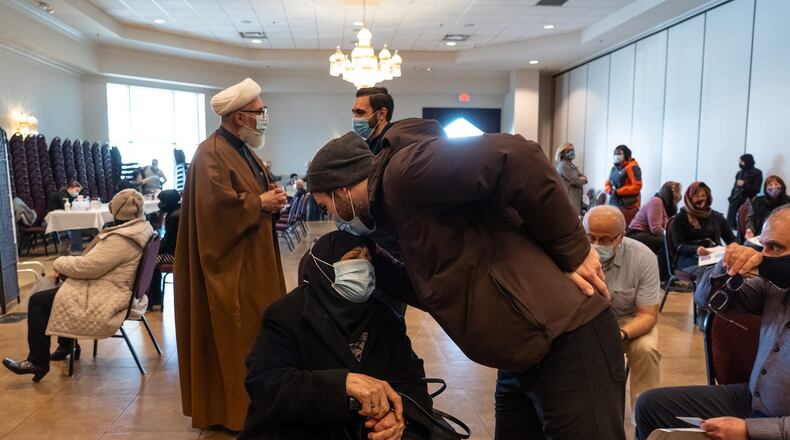Shaikh Rahman, a business systems analyst in Chicago, was not a proponent of COVID-19 vaccines because he did not feel that credible information about them was being disseminated effectively and the distribution seemed rushed.
“Our faith says to investigate a matter before passing it off as truth,” he said.
But Rahman’s sentiment changed after his local Imam, Shaykh Jamal Said of the Mosque Foundation in Bridgeview, Ill., began to suggest that those who were not vaccinated may be prohibited entry to the mosque.
Rahman was concerned about this potential restriction for prayer services, and he considered getting vaccinated. He had tested positive for the virus prior to this potential restriction. So he decided to get the shot to build up his immunity after the Mosque Foundation held a Pfizer vaccination drive.
“With the country reopening,” Rahman said, “I don’t want my family or my loved ones to be at risk of exposure through me.”
While vaccine hesitancy trends continue to evolve across the United States, a shift also is underway within some Muslim communities. Vaccine rates among Muslims had been among the lowest in the nation in the early months of the pandemic.
But outreach programs from mosques, community organizations and cultural centers that work with immigrant communities are helping to dispel disinformation and promote vaccination.
As they hear from trusted figures, such as imams, some Muslims are now opting to get the shot.
Among the organizations having an impact is the Somali Family Service of San Diego (SFS). It has a program called Ihsan Health Initiative, which includes a team of community health workers who provide direct outreach through events such as virtual town hall meetings.
“The virtual townhall meetings have helped combat some of the skepticism by allowing us to invite respected leaders in the community, such as doctors, nurses and Masjid imams,” said Balqiso Hussein, a community health worker from SFS, who mainly works with the Somali population.
“When presented with scientific evidence in a culturally competent manner, we have seen changes in ideologies concerning the vaccine. Many community members even scheduled vaccine appointments that same day.”
SFS has hired community health care workers who speak Arabic, Swahili, and Somali. There are plans to reach out to the Afghan community.
“Using the same [native] language to speak to my clients, coupled with Friday khutbahs [sermons] delivered by the local imams, has had a significant impact in trying to shift the mindset of people in their willingness to be vaccinated,” said Aous Alhabbar, a health worker who engages with the Iraqi community.
“While there was a lot of fear in the beginning of the pandemic, that is slowly changing through outreach.”
Some of the hesitancy stems from racism experienced during medical visits.
“Many feel that the healthcare system does not work to promote their well-being,” Hussein said. “Many community members, especially the older groups, felt very hesitant when the vaccines were fully administered nationally. Much of the hesitancy comes from personal experiences with health professionals who have failed to accommodate community members due to language and cultural barriers.”
Religious beliefs also have been a factor for some who are still hesitant to get the shot.
The question of what is permissible under Islamic law has come up repeatedly across the Muslim community.
“Initially, I was hesitant because I wasn’t sure of the science, and permissibility was a question with regards to the ingredients,” said Shaykh Amin Kholwadia, a Muslim scholar and founder of Darul Qasim, an institute of traditional Islamic teachings based in Glendale Heights, Ill.
Following reports that at least one of the vaccines used cell lines derived from fetal tissues, many Muslims questioned whether it would be halal to have the shot administered.
Kholwadia signed a statement issued by his organization that said, “Using cell lines, initially developed from aborted fetuses, to develop vaccines is against Islamic Bioethics. Muslims may not take vaccines which are developed in this way considering the permissible alternatives.”
Kholwadia explained that under Islamic law, “No part of the human body (including fetuses) can be used for experimentation.”
While the ruling issued by the Darul Qasim organization legitimized hesitancy among some Muslims, specifically for shots tied to early vaccines developed by Johnson & Johnson, it also served as encouragement for vaccinations developed by other companies.
“Why would I not prefer the mRNA vaccines, especially if it is not going to put my akhira [afterlife] in jeopardy?” asked Akber Ali, an attending physician at an Illinois hospital, who works with Darul Qasim.
Not everyone is convinced.
Bint Aden, a recent graduate from Southern California who earned a bachelor’s degree in psychology, said she and her family still have questions about the vaccine ingredients and whether they are permissible under Islamic law.
“While mosques have allowed the vaccine, with my roots in Somalia, it’s unclear what is allowed,” she said. “We believe in qadr [fate], what is meant to be is destined to happen by the work of Allah (God), which involves both sickness and health.
“I still want to wait and see,” Aden said. “I don’t feel comfortable taking the vaccine yet.”
Tasmiha Khan writes for National Geographic. This story is part of the Solutions Journalism Network, a nonprofit organization dedicated to rigorous reporting about responses to social problems. It originally appeared here.
About the Author
Keep Reading
The Latest
Featured


